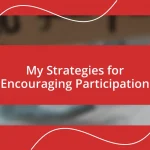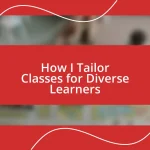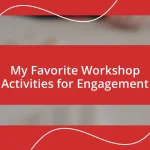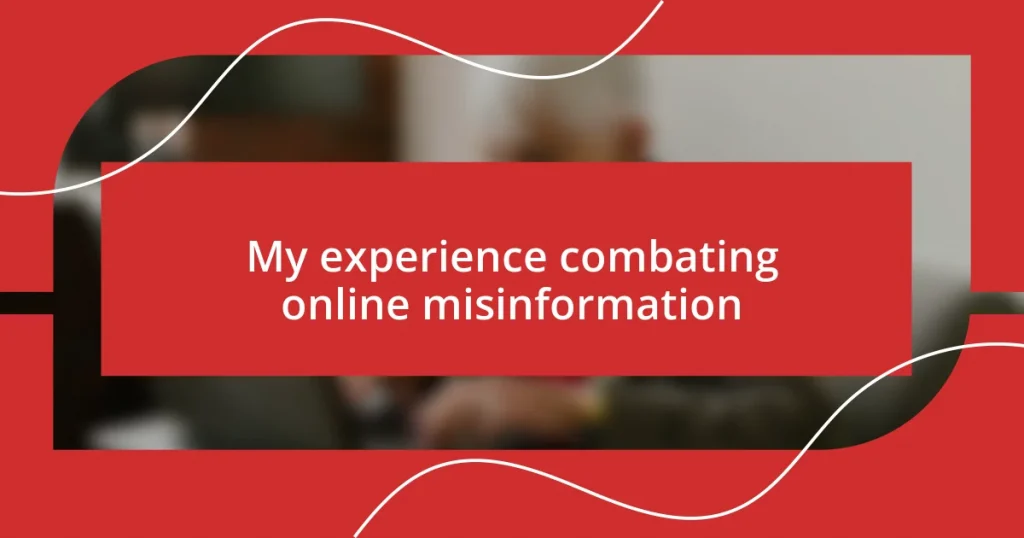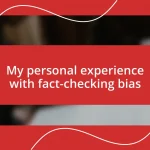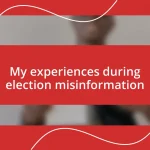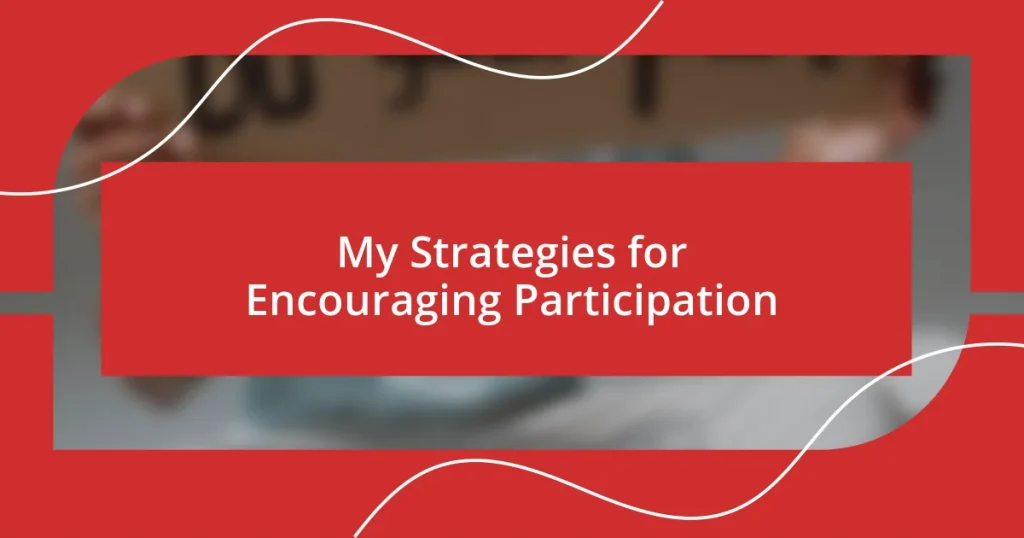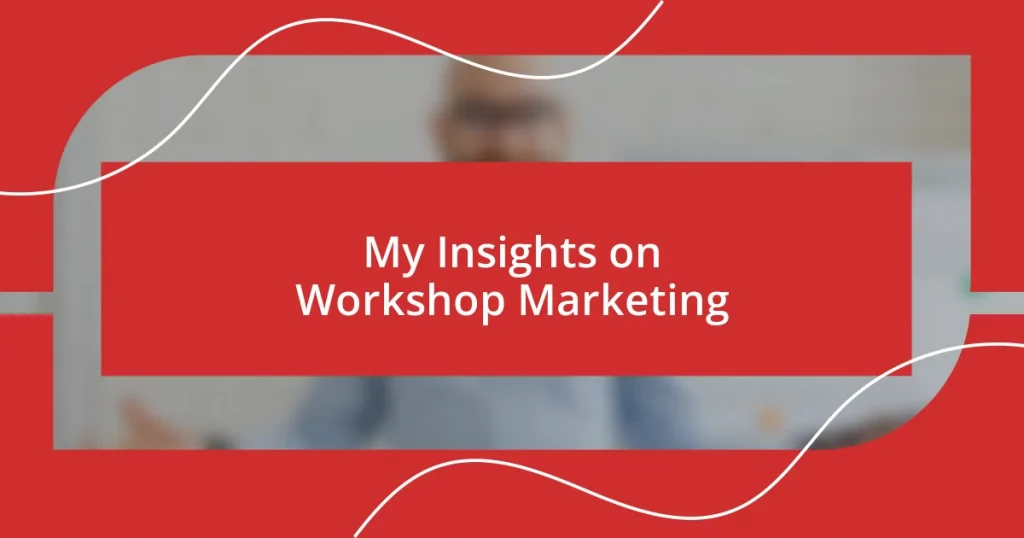Key takeaways:
- Recognizing the emotional influence and echo chambers in the spread of misinformation is crucial for developing critical thinking.
- Media literacy empowers individuals to evaluate sources, defend beliefs, and engage in informed discussions.
- Effective strategies to combat misinformation include questioning claims, sharing accurate information, and tailoring communication to the audience’s needs.
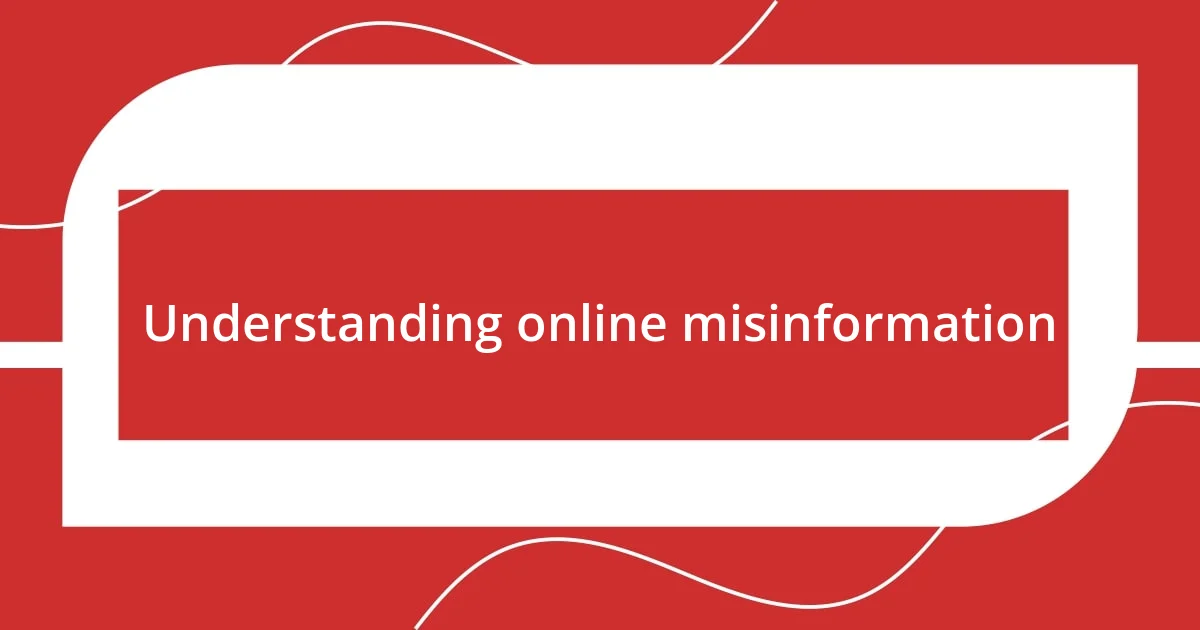
Understanding online misinformation
Navigating the world of online misinformation feels like walking through a maze. I remember a time when I stumbled upon a social media post claiming a miracle cure for a common illness. My heart raced at the thought of something so simple, yet a nagging feeling made me pause—how could something so effective not be widely known? That experience highlighted how easy it is to be swept away by sensational claims, reminding me just how crucial it is to verify information before believing it.
Understanding online misinformation goes beyond mere facts; it taps into our emotions and desires. Often, we want to believe in quick fixes or solutions that resonate with us. I’ve found myself sharing articles that tugged at my heartstrings, only to later realize they were misleading. This connection to our feelings can create blind spots in our judgment—how often do we stop to question the validity of something that gives us hope or relief?
Moreover, it’s essential to recognize the role of echo chambers in the spread of misinformation. I recall discussions with friends who shared similar views but were unaware of the biases in the sources we relied on. It struck me how easily we can fall into the trap of only hearing what we want to hear. Couldn’t these biases cloud our judgment and leave us more susceptible to falsehoods? Understanding this aspect of online misinformation is crucial if we hope to engage in healthier and more informed conversations.
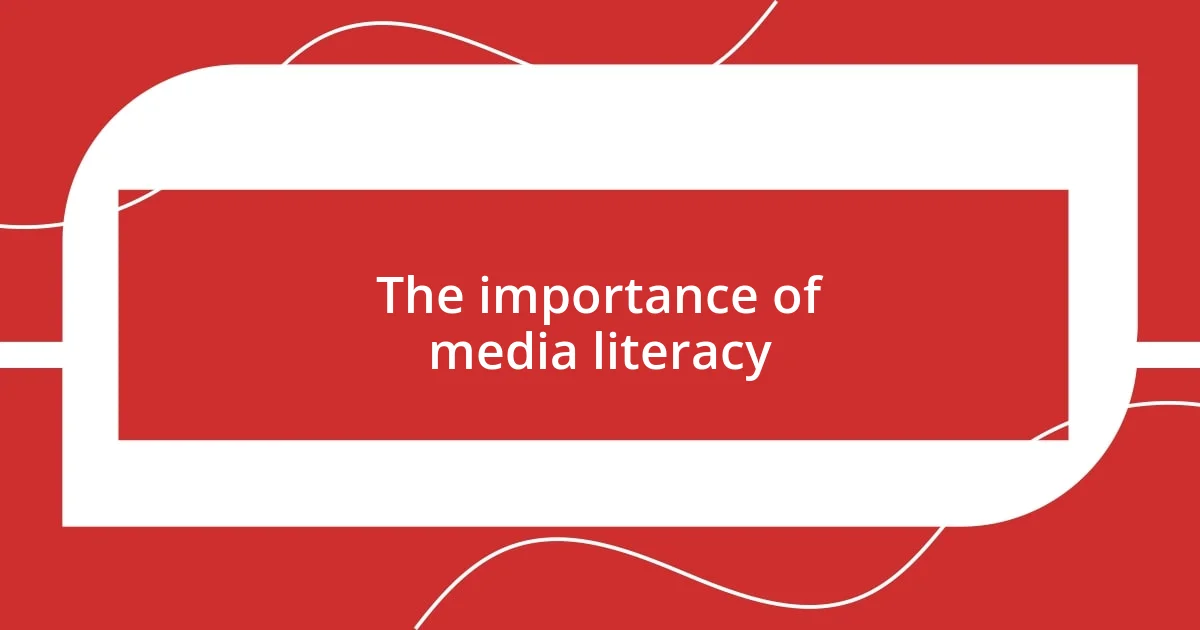
The importance of media literacy
Developing media literacy is not just an optional skill; it’s an essential tool in our daily lives. I remember my first year in college, where a guest speaker shared various strategies for evaluating sources. At that moment, I felt a sense of empowerment. Understanding how to dissect information—like checking for credible authors or identifying potential biases—transformed my approach to news and social media. It’s a game changer to scrutinize what you read, which helps foster a more informed perspective while avoiding pitfalls.
Here are some key reasons why media literacy matters:
- Critical Thinking: It encourages questioning assertions and digging deeper instead of accepting everything at face value.
- Self-Defense: Media literacy acts as a shield against misinformation, helping me and others defend our beliefs with valid evidence.
- Informed Decision-Making: A well-rounded understanding aids in making choices rooted in facts rather than sensationalism.
- Empathy and Understanding: Being media literate fosters empathy, as it allows one to appreciate different viewpoints, leading to more productive discussions.
Ultimately, mastering media literacy equips us to navigate the complex information landscape and promotes a healthier dialogue about the world.
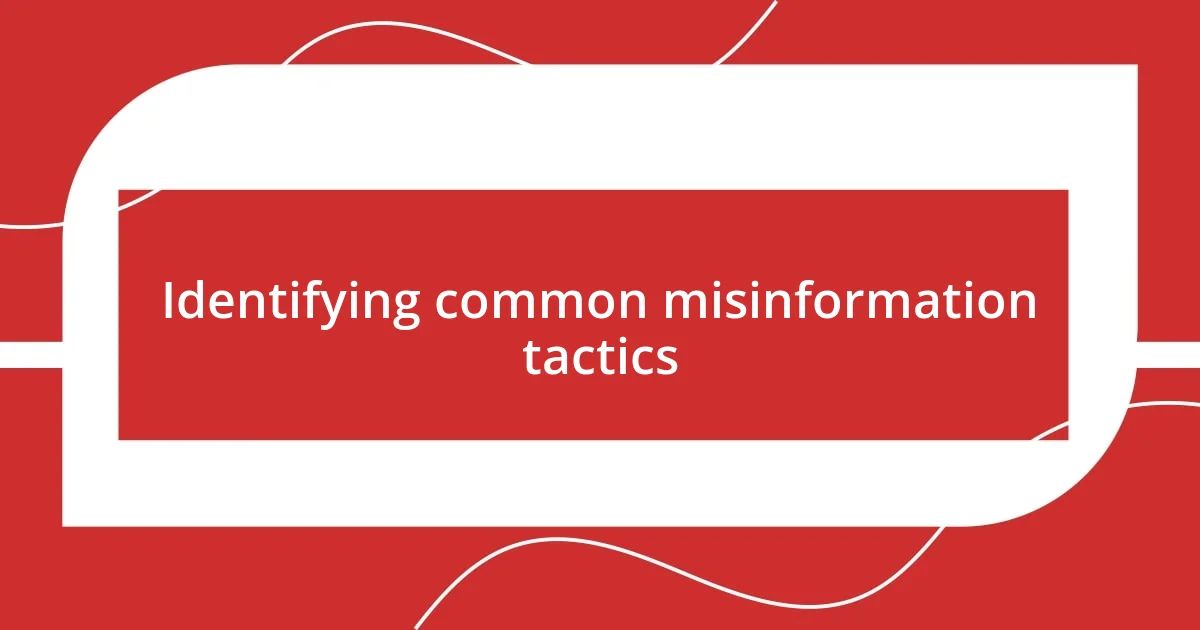
Identifying common misinformation tactics
Identifying misinformation tactics can feel like peeling an onion—layer after layer reveals something deceptive underneath. One tactic that stands out in my experience is the use of emotionally charged language. I recall scrolling through a blog article that was laden with alarming phrases about a new trend. Despite my skepticism, the sensational wording caught my attention and stirred anxiety. It reminded me how easily our emotions can be manipulated to believe something that may not be true.
Another common tactic involves cherry-picking data to support a specific narrative. I once came across a post using statistics that looked impressive on the surface but omitted vital context. It dawned on me how easy it is to shape an argument by selectively presenting information, creating a distorted reality. This experience taught me the significance of seeking the whole picture rather than accepting isolated facts that fit a certain agenda.
Finally, the use of unreliable sources cannot be understated. I’ve encountered numerous articles citing dubious “experts” with little to no credentials. It struck me as concerning how easily the internet can give a voice to misinformation that masquerades as fact. In my journey to combat misinformation, I learned to prioritize credible sources, which has become a guiding principle for me in my quest for truth.
| Misinformation Tactic | Description |
|---|---|
| Emotionally Charged Language | Uses intense words to provoke strong emotional reactions, distracting from factual accuracy. |
| Cherry-Picking Data | Selects specific pieces of information or statistics to create misleading narratives. |
| Unreliable Sources | Cites individuals or organizations lacking proper credentials, undermining the credibility of claims. |
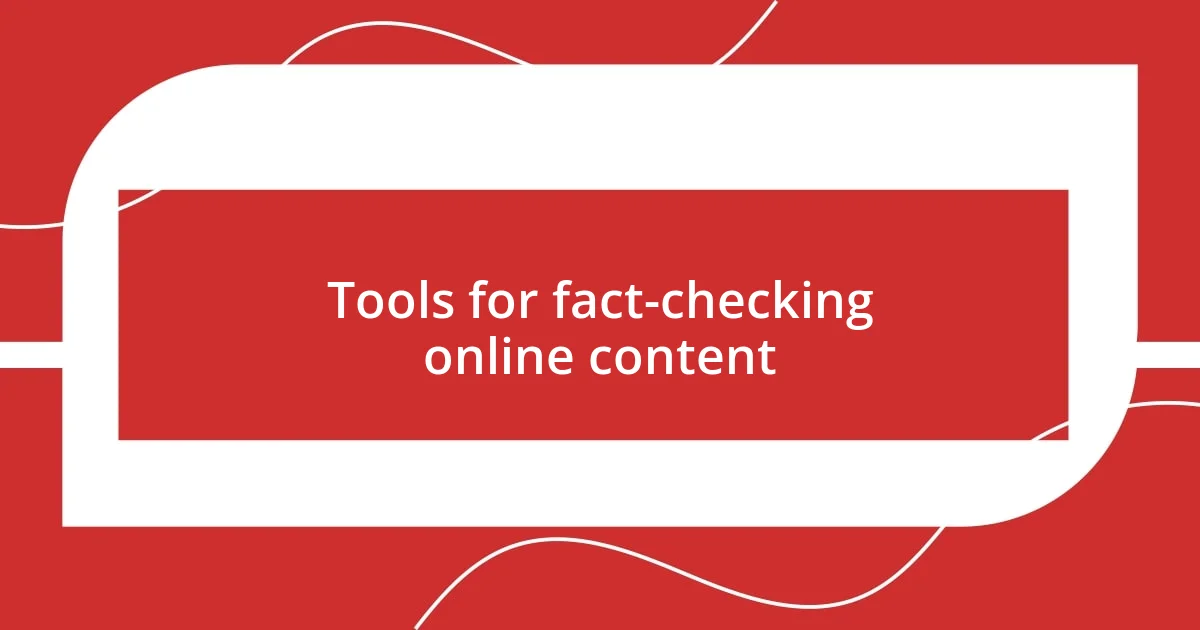
Tools for fact-checking online content
One powerful tool I often turn to for fact-checking online content is Snopes. I vividly remember a time when a viral post about a supposed government policy caught my attention. Curiosity led me to Snopes, where I found a thorough breakdown of the claims made in that post, debunking it entirely. The satisfaction of uncovering the truth felt invigorating, and Snopes’ straightforward format made it easy to digest the details.
Another resource that has proven invaluable in my experience is FactCheck.org. I stumbled upon this site while navigating an overly sensational news article. I was amazed by how quickly I was able to cross-reference the claims presented with well-researched insights. Isn’t it comforting to know that a broad range of fact-checking organizations exists? They help cut through the noise and provide clarity in a world overflowing with information, guiding you towards reliable conclusions.
Lastly, I can’t overlook browser extensions like NewsGuard. I decided to install it after feeling overwhelmed by the sheer volume of dubious articles popping up in my feed. Just knowing that my browser was now equipped to flag unreliable sites gave me a new sense of security. Have you ever felt that wave of relief when you realize you’re armed with the right tools? With NewsGuard, I gained confidence in my reading choices, allowing me to spend less time questioning sources and more time engaging with credible information.
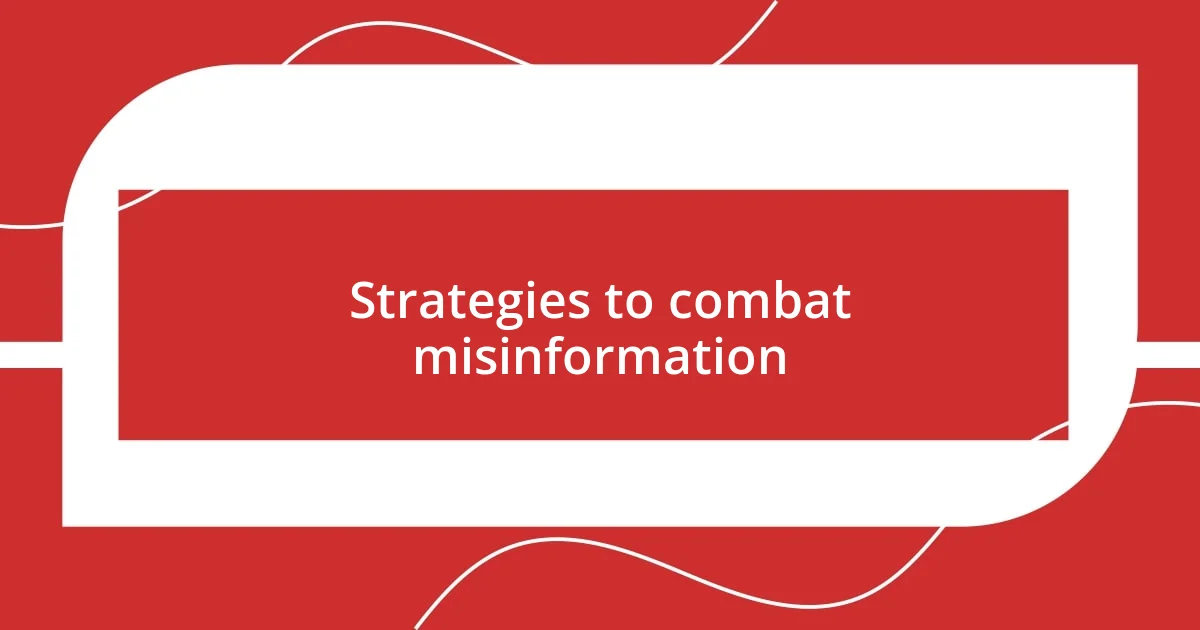
Strategies to combat misinformation
One effective strategy I’ve found for combating misinformation is simply asking questions. I remember reading a post that stirred my curiosity about a controversial topic. Instead of accepting the information at face value, I started to question the claims: Who is behind this? What evidence supports it? This approach not only kept me grounded but also sparked interesting discussions with friends who hadn’t considered the deeper implications of what they were reading.
Another crucial tactic is to engage in media literacy education. I participated in a workshop one summer that opened my eyes to the techniques used in misinformation. Learning about things like cognitive biases and how they shape our perception helped me develop a more discerning eye. Have you ever found yourself nodding along with information that felt right but wasn’t? This experience served as a reminder that knowing the mechanics of misinformation can empower us to resist it rather than become unwitting accomplices.
Lastly, I encourage sharing accurate information within your social circles. I often take the time to send friends links to well-researched articles or fact-checking sources when I see them sharing questionable content. I recall a moment when a friend posted misleading information about health practices, and I gently offered a credible article instead. Not only did this help clear the air, but it also sparked a larger conversation about the importance of verifying claims. It felt rewarding to contribute positively to our collective understanding and helped build a community of critical thinkers.
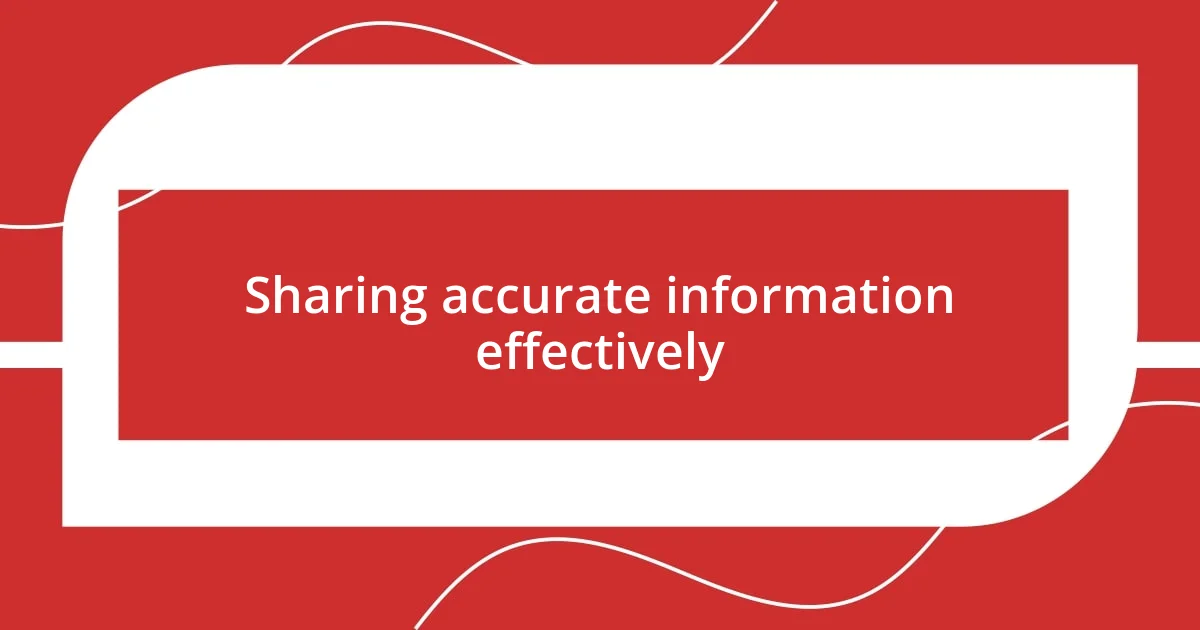
Sharing accurate information effectively
One of the most fulfilling experiences I’ve had with sharing accurate information effectively came when I began to create my own content around common myths. I remember a conversation where someone casually repeated a common misconception about nutrition. I took that moment to craft a quick, informative post on social media, using reliable sources to address the claim. It was incredibly rewarding to see my friends engaging with the content and asking questions! Have you ever had that moment where you felt like you were changing the narrative, even if just a little?
Another approach I’ve found impactful is tailoring the way I present information based on the audience. For example, during a community event, I shared insights on browsing health information online. I could see the interest in people’s eyes when I backed my statements with relatable examples from our own experiences. This connection not only made the information more memorable but also fostered a sense of trust. Have you considered how a simple change in your delivery could make your message resonate more deeply?
Empathy plays a crucial role in effective information sharing. I vividly recall a time when I encountered a friend who was anxious about a trending topic. Instead of bombarding them with facts, I took the time to listen to their concerns first. This approach allowed me to address their specific fears with accurate information gently. Doesn’t it feel great when you can turn anxiety into understanding? By being patient and understanding, I was able to create an open dialogue that made both of us feel better informed and more empowered.
